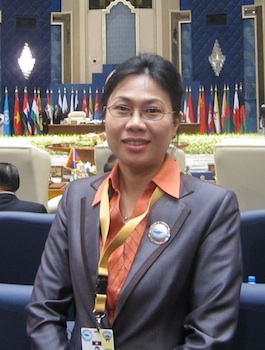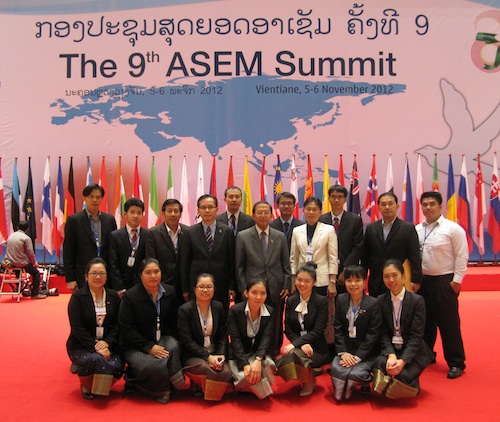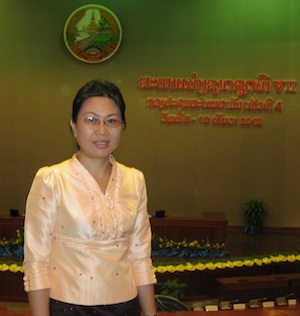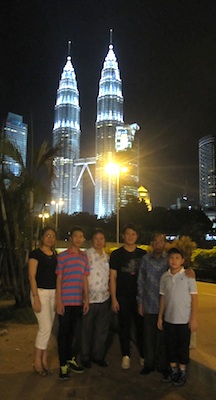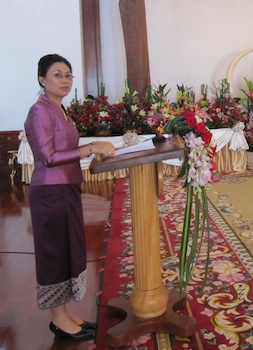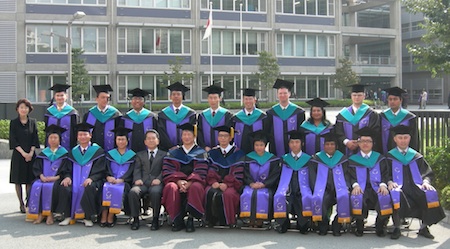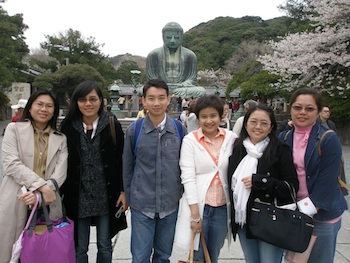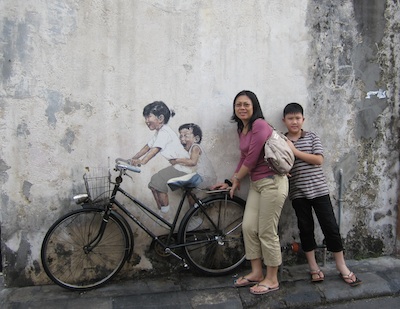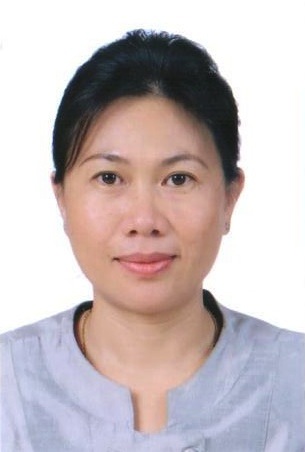 Phongsamouth Anlavan, Laos
Phongsamouth Anlavan, Laos
Counsellor
Embassy of Lao PDR in Kuala Lumpur
Young Leaders Program (’08)
Please tell us about your career thus far. What is your area of specialization and how did you come to work in this area?
After I graduated with a Bachelor’s degree from the College for Foreign Trade in Budapest, Hungary in 1992, I started working as a civil servant at the former Ministry of Commerce and Tourism – now renamed as the Ministry of Industry and Commerce – of Laos in 1993. I was recruited in the Department of Export Promotion and worked there for 6 years.
In 1997, Laos joined ASEAN and then two years later the Department of Economic Affairs was established under the Ministry of Foreign Affairs. I was one of the officials to be assigned to work for the new Department. At that time, one of the main tasks of the Economic Affairs Department was dealing with the ASEAN economic cooperation, in addition to economic relations under the framework of other sub regional or multilateral cooperation such as the Greater Mekong Sub-region, Ayeyarwady-Chao Praya-Mekong Economic Cooperation Strategy (ACMECS), Mekong-Ganga Cooperation etc., as well as with international financial institutions such as the IMF, World Bank and ADB. The department was divided into four divisions. I was in charge of the Economic Research Division that mainly focused on analyzing and studying certain economic issues related to the international relations.
In addition to becoming an ASEAN member, Laos also joined other international groupings/organizations such as the Asia Cooperation Dialogue (ACD), Forum for East Asia and Latin America Cooperation (FEALAC), and the Asia-Europe Meeting (ASEM process) a few years later. The Economic Affairs Department was tasked to work as National Secretariat of the three above-mentioned multilateral dialogues for Laos. From 2004 to 2007 I worked as a contact point dealing with these three fora for Laos.
After completing the Young Leader Program at GRIPS in 2008, I returned to the Ministry of Foreign Affairs and continued working for the Economic Affairs Department. I was made in charge of the Division of General Economic Cooperation dealing with matters related to IMF, World Bank and ADB. Then a year later I was reassigned to look after the Division of Sub Regional Cooperation which covers ASEM, ACD, FEALAC. At the same time, we also had to closely cooperate with line ministries, especially with the Ministry of Industry and Commerce regarding the negotiations and preparations for WTO accession of Laos. It seems that after a long tour in the Department from one division to another, in February 2010 I got promoted to Deputy Director-General (DDG) of the Economic Affairs Department.
In 2010, when Laos was trusted by the ASEM partners to host the 9th ASEM Summit in November 2012, and to become an ASEM Coordinating country for the ASEAN group from 2010-2012, the ASEM Division was established within the Department. It functions as the ASEM national secretariat for Laos focusing solely on ASEM related issues while coordinating with all line agencies concerned in Laos as well as with all ASEM partners. As a DDG, I was assigned to be responsible for this new ASEM Division. Imagine! It was a tough period of two years starting almost from scratch with preparing for hosting such big international event, by far the largest in Laos’ history, for which we invited the Head of States/Governments from 51 ASEM partners from Asia and Europe to gather in Laos.
Finally, the 9th ASEM summit was successfully held on 5-6 November 2012 in Vientiane Capital. The year 2012 was a kind of ‘Golden Year’ with two big successes for Laos that our department got involved in. The first was to host ASEM9 and its sideline events (such as ASEP7, AEPF9, AEBF13), and the second was the accession to WTO as Laos was finally accepted as a member of WTO after 15 years of negotiations. Even though my role might have been minor, I am very proud to have been part of these historical achievements. Finally, from February 2013 I have been assigned to the diplomatic mission abroad as Counsellor at the Embassy of Lao PDR in Kuala Lumpur, Malaysia.
You also served as the Asia-Europe Foundation’s (ASEF) Governor for Laos. Please tell us about this experience.
It was a short time of only 1 year (2010) when I was assigned to replace my boss who had been preparing for a long-term mission abroad. It was another challenging period for me when I had to take a role as ASEF Governor for Laos in preparing to host the 25th annual ASEF Board of Governors Meeting in Luang Prabang, Laos. Luckily, I had a very supportive team from ASEF secretariat and my strong team from the ministry and of course a close supervision from the Vice Minister, who is ASEM SOM Leader for Laos and from the current Director-General of Economic Affairs Department. With their full supports, the meeting was successfully held. In 2011 I stepped down as the Governor for Laos and continue ASEM contact point preparing for the ASEM Summit to be held in November 2012.
You are currently posted as Counsellor at the Lao Embassy in Kuala Lumpur, Malaysia. What are your main responsibilities and duties?
My main task is to follow up, support and try to strengthen bilateral economic relations in particular, trade and investment between Laos and Malaysia. In practice, we try to facilitate and provide information on trade and investment as much as we can to companies and businessmen who are interested in trade with or investment in Laos.
What are some of biggest challenges you face in your work?
Although both Laos and Malaysia are members of ASEAN and trade with the ASEAN member countries is very important for both counties, on a bi-lateral level Laos is a small trading partner for Malaysia in terms of both import and export. In contrast, Malaysian investment in Laos ranks at the top ten of total foreign investment. As Laos is not a major economic partner for Malaysia, the biggest challenge for me is how to encourage the people in Malaysia to understand, and to recognize opportunities for more mutual cooperation, resulting in more business and strengthening of bilateral economic relations between our two countries. For this purpose I have to be more active, proactive and closely coordinate with our headquarters for more updated information which is another challenge in my daily work.
What have been the most interesting or rewarding aspects of your career thus far?
As explained, as Deputy Director General of the Department of Economic Affairs, at the Ministry of Foreign Affairs of Laos, I was part of the special LAO PDR task force responsible for preparing the hosting of the 9th ASEM Summit and its related sideline events in 2012. I consider this as my great reward, maybe the best in my career thus far. The Summit was very successful and its output, including the Chair’s Statement and the Vientiane Declaration on Strengthening Partnership for Peace and Development, has played an historical role in bringing Asia and Europe closer together in the field of mutual political and economic cooperation. With little prior experience, Laos had done a good job and all guests applauded and congratulated the host for the success.
It has to be said though that the ASEM’s Senior Officials Meeting (ASEM SOM) held before the summit was extremely exhausting. It was a 3-day and one whole night marathon-meeting, finishing with a 23-hour (almost) non-stop meeting from 9 a.m. till 7:45 a.m. the next morning. Being part of this official international conference has been one of the most interesting experiences in my career thus far.
What do you see as the main challenges and opportunities for Laos-in terms of international or diplomatic relations over the course of the next five to ten years?
Laos is a small country in terms of its area and population in Southeast Asia. During the last two to three decades its international relations have substantially increased and broadened. It is clear that in today’s era of interdependence, mutual cooperation and integrated grouping top the agenda of many nations. Actually, Lao people are peace-loving people and we have political stability. The Lao government’s foreign policies also facilitate Laos to move towards further global economic integration. Some of the most important opportunities for Laos in the next 5- 10 years, I think, are 1). Trying to maximize the benefits from being a member of WTO; 2). Integrating into the ASEAN Economic Community by 2015; and 3). Having the government’s 5-Year National Socio-Economic Development Plans to serve as a vision of the country’s development. These sorts of opportunities, I think, could also serve as a catalyst for a brighter future of Laos.
At the same time there are lots of challenges. One of them is how to gain regional competitiveness while Laos is still facing a lack of human resources development; or how to increase its awareness and utilize opportunities to bring the highest benefits to the country on the basis of mutual or win-win solutions.
What led you to GRIPS? What was the most important thing you learned while here, and how has your experience at GRIPS prepared you for future endeavors?
It was quite a long way. After working for a while, I realized the need to improve myself and started looking for further study opportunities at Master’s level to get more confidence in my career. I knew GRIPS through a good friend of mine who also graduated from GRIPS under the Young Leaders Program a few years earlier. I almost gave up when I was (unofficially) informed that I was not eligible to apply for this scholarship because it was not distributed to the Ministry of Foreign Affairs. I was curious and asked for more information and permission to apply for it. Luckily, I got full support from the Ministry and finally my dream came true when I got a positive response from GRIPS. Thus, I became the first Lao student under YLP at GRIPS from the Ministry of Foreign Affairs of Laos. Up to date I still recommend my colleagues from the ministry to apply for this scholarship at GRIPS.
I found studying at GRIPS (under YLP) was really intensive as we had to finish everything within one year but I could learn a lot. Commitment, discipline, knowledge and skills on public policies gained during my studies in Japan are very useful in my current life and career.
What is your fondest memory of your time spent at GRIPS?
The friendship and kindness from friends, professors and staff of GRIPS are in my long lasting memory. Although one year was so short for me to learn and experience more Japanese culture, I really enjoyed my stay there, including the food, sakura (cherry blossom), the shinkansen, and the daily commute on the yurikamome driverless train. GRIPS’ programs and especially the field trips provided some great opportunities to visit many places outside Tokyo. And every time when I had a chance to return to Tokyo, in 2010 and 2011 when I joined a mission attending a conference in Tokyo, I visited some friends and professors at GRIPS. Even just passing by at GRIPS or crossing the Rainbow Bridge, reminds me of my good times and memories in Japan. I am very thankful to GRIPS for giving me such a good chance to stay in Tokyo!
What do you miss about Laos and what do you like most about living in Kuala Lumpur?
Laos is my motherland, where I grew up and spent most time of my life. Feeling homesick is unavoidable, and I especially miss my family, friends, colleagues, food and some special cultural events held annually.
About living in Kuala Lumpur, I confess, I am really new as I just moved here only about three months ago, but it also feels like a second home as I am staying with my two younger sons and my husband who has already been in Kuala Lumpur and working at the Embassy more than one year.
I find Malaysia very interesting and diverse, and indeed “truly Asia” as it is pictured in Malaysia’s tourism promotion campaign. It seamlessly combines modern urban life and natural diversity. The Petronas Twin Towers are fantastic but at the same time the city is very green with trees everywhere, and palm oil and preserved wild forest. Last month I had a chance to visit Sarawak (Kuching) at Borneo Island. I was extremely impressed with the natural scenery and its culture. Malaysia is one of the world’s best places for eco-tourism. I am sure I will enjoy living in Malaysia for another three years and there are many wonderful places I would like to visit.
What is your favourite thing to do when you are not working?
I am a mother of three boys, aged 10, 14 and 19. They are enough of a handful to have made me fully engaged with them after work, especially when their father was abroad or out of town on a mission. Taking and picking them up to and from school, cooking, and sometimes playing with them just for fun, e.g. when they needed a soccer goal keeper for their game in the backyard.
Actually, my favorite hobbies are gardening, and exercising and on longer holidays we usually visit grandparents and gather with friends or relatives who live in other cities or provinces. In my recent free time, I try to explore and to learn more about Kuala Lumpur.
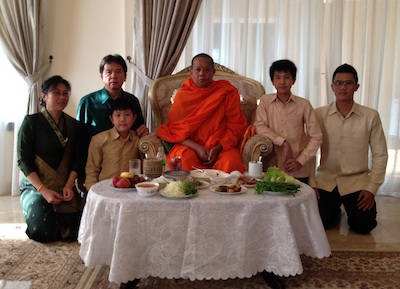
A monk from Laos has come to bless the family at the Lao New Year celebration in April in Kuala Lumpur
How do you maintain the balance between work and the rest of your life?
Well, this is not easy for me. I try my best to balance as much as possible between family and work, but it is still difficult as both, my husband and I, are diplomats and quite often travelling on official missions to different countries. Our time staying together with the whole family is quite rare. I feel that being a good mother and being fully committed to work at the same time is something really hard to achieve in practice. It happened sometime when both my husband and I were away at the same time. Luckily, my parents, who live nearby our house, were so kind to take care of our sons and family. But time’s flying fast and I believe the hardest times are behind us as our sons have grown up and can take care of themselves. Now I enjoy the happy times again, being reunited with the family in Kuala Lumpur. The harder we will work today, hopefully will guarantee our enjoyable life in the future.
What advice would you give to current GRIPS students?
Please do not give up when getting stuck on something or when facing any difficulties. Keep going, consult with friends and professors and be committed. Then, I’m sure, you will find a way to solve your problems. Try your best and be hardworking, but don’t forget to enjoy living in and travelling around Japan. It is a very beautiful and charming country.
Do you have any suggestions on how to further utilize the GRIPS alumni network?
What the GRIPS alumni network has been doing is excellent and very useful. We still have good opportunities to learn and share experiences with each other. Keep this rolling. I very much appreciate having been given this opportunity to share my experiences here. Thank you.





